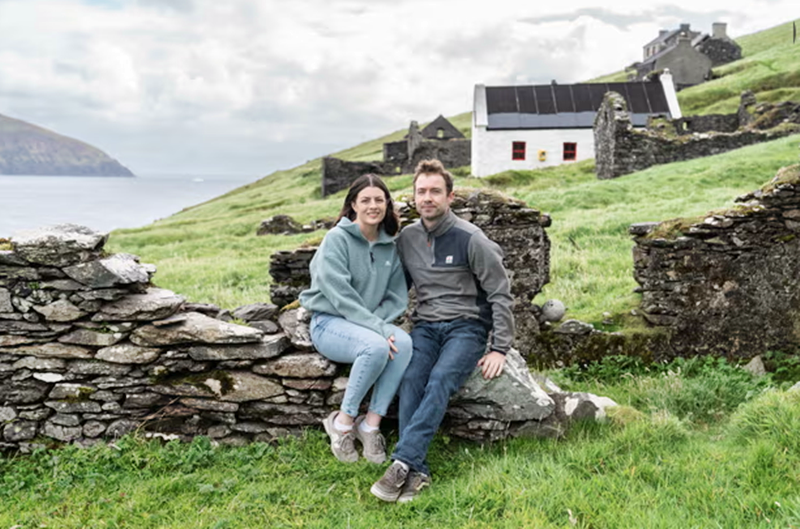We’re the caretakers of an uninhabited Irish island called Blascaod Mór

By Guardian - Emma Melay - Fri 20 Sep 2024 10.00 BST
We’d seen an advertisement for a six-month posting for caretakers on Blascaod Mór – the Great Blasket – and decided we’d give it a go. There’s a colony of 2,000 seals with sharks, dolphins and whales nearby.
My partner Darren and I had been teaching in Celbridge, in County Kildare, for three years before we took a career break. We enjoyed travelling by campervan around Ireland and working in a guesthouse on the Aran Islands.
The Great Blasket is the largest of the six Blasket islands off the west coast of County Kerry, and famous in Ireland because islander and storyteller Peig Sayers’s 1936 autobiography, Peig, was taught in schools. The job would involve helping run the island’s three holiday cottages and small cafe, owned by a couple, Alice and Billy, who live in the town of Dingle on the mainland.
We didn’t expect to hear anything after sending in our form, knowing that tens of thousands apply, but a week later we had a Zoom interview. That was basically Billy telling us we’d be mad to do it, going to an island with no electricity or hot water. But we’re used to simple living, and the more Billy described it the more we wanted this once-in-a-lifetime experience. About two weeks later, we were offered the job. We were shocked, then elated.
On 1 April this year we arrived on the uninhabited windswept island, 2km from the mainland. It’s about 5.2km by 1km of unspoilt, hilly land. Guests rent the traditional cottages between April and the end of September, after which the seas are too rough to get here. The last islanders left in 1953 because of a lack of access to emergency services. After just a few days here, we understood what it must have been like for them: Storm Kathleen arrived and marooned us alone for 12 days, as no boats were able to dock.
We weren’t too worried, though, and it was a special time. Most days were dry, and hundreds of undisturbed seals lay on the sandy beach. There’s a colony of 2,000 seals with sharks, whales and dolphins nearby. Seabirds screeched eerily at night and rested on the back hill during the day. Sheep wandered along our cliff walks. Rabbits and hares passed by.
Our cottage is cosy, with a stove and photos of previous islanders dotted around. There’s a small wind turbine with enough power to charge a phone, but no fridge or freezer.
After the storm, we settled into a rhythm of seeing visitors, helping with the cottages and meeting Alice and Billy on their boat at the pier to collect fresh groceries. We have breakfast looking over the kitchen half-door, watching the seals move with the tide. Most evenings we watch spectacular sunsets.
In May, we saw the northern lights. They were magical – there’s no light pollution here. It was 1am when we saw the sky light up purple, with shades of bright pink and green. Every day in June, as a challenge, we swam in the very cold Atlantic Ocean. In August, shepherds came from the mainland to shear the island’s 300 or so sheep.
Some evenings, we invite the cottage guests to join us round a fire pit. Indoors, when it’s dark, we use tealights, head torches, firelight and candles, with the stove for heat. We’re reading books by islanders, including Peig. We speak a decent amount of Irish, and sometimes speak it with locals and international visitors wanting to practise theirs, even if it’s just asking for cupán tae in the caifé.
Darren and I have been together for two years now. This time here has been brilliant for our relationship – we’ve grown closer and rely on each other a lot. Friends visit us, so mostly we miss our families, though my parents came over for my birthday. Receiving visitors, chatting to guests, and engaging in activities such as hiking, swimming, reading and photography keeps us busy. We haven’t really felt isolated during our time here.
Free weekly newsletter
The only way to get a look behind the scenes of the Saturday magazine. Sign up to get the inside story from our top writers as well as all the must-read articles and columns, delivered to your inbox every weekend.
Privacy Notice: Newsletters may contain info about charities, online ads, and content funded by outside parties. For more information see our Privacy Policy. We use Google reCaptcha to protect our website and the Google Privacy Policy and Terms of Service apply.
The time is flying by, and we leave on 1 October. We’ll be sad to go, but look forward to having another adventure before returning to teaching. We’ll try to make it back here every year for the rest of our lives. Applications to replace us will now be capped at 300. Our advice to anyone thinking of applying? Go for it.
As told to Anna Derrig
